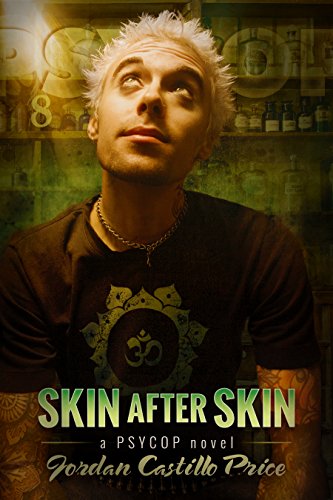 Skin After Skin
Skin After Skin PsyCop Book 8
M/M Paranormal UF
JCP Books LLC
June 23, 2017
387


Review by Ulysses Dietz
Member of The Paranormal Guild Review Team
I’m raising my metaphorical glass to long novels. I’m tired of novellas and short novels that foster the notion that readers of gay romance have short attention spans and are impatient. I’m a smart guy and I read all the time. I can embrace and savor a 500-page book. Especially one this good.
However, I confess I was mystified by how this book fit into the PsyCop series until 70%. Then the penny dropped. It says something that the story is so fully engaging that I wasn’t really worried about this lack of connection. Truthfully, I read the last installment of the PsyCop series years ago (my four-star review appeared on September 8, 2013), with hundreds of books in between, so lots of the details had blurred and faded in my mind.
But that is the charm of this low-key epic; it is a parallel track that follows the life of a secondary character from a time long before he encounters the PsyCop world. Curtis Ash, known as Crash, plays an important secondary role in Victor Bayne’s tumultuous life. It was only when Victor walks into Crash’s shop that I suddenly saw the whole connection.
Now, I really didn’t like Crash at all. I didn’t warm to him in the PsyCop series, and in the first half of this book devoted to him I didn’t like him at all. This isn’t just because I’m old. I remember being in my 20s very clearly, and Crash is the kind of cocky, punk-rock twink I avoided. It may have been envy, but I can’t deny what I felt at the time. Crash brings back all those feelings. What is remarkable is that I think the author did it on purpose.
This is the little miracle of Skin After Skin; it is the story of Crash’s coming of age; of a self-conscious young man with an attitude growing into maturity as he embraces not only the limits of his world-view, but parts of his own being that he has denied and suppressed for all his previous life.
The book is divided into three parts, each separated by some time. The time flow is not heavily impressed on the reader, and I found this a little vaguer than perhaps I’d have liked. But what happens in each of these distinct parts of Crash’s young life is what matters.
In spite of the fact that Crash forms two strong romantic connections in Skin After Skin, it is actually four women who are crucial in Crash’s evolution: his zaftig BFF Pilar in the first part; his eccentric downstairs neighbor Lydia in the second part; PsyCop detective Carolyn Brinkman and his mother, Maxine, throughout. Carolyn is a wonderful character, and the link that opens the PsyCop world to Crash’s world. Lydia plays Greek chorus to a new, more open-minded Crash, while his friendship with Pilar, for all its loyalty, is limited by Crash’s own sense of his lack of power to change things. Pilar is stuck in Crash’s past; Lydia is his welcoming committee to a present of which he is not yet sure.
One of the reasons I disliked Crash early on is his dismissive treatment of his affluent suburban mother (something that, even as a young gay man, I never did). But there’s an edge to this, and I understood their relationship better as Crash begins to embrace his changing life and we learn more about his youth. There is moment of exquisite beauty when Crash and his mother work together on his new shop and connect in a way they haven’t since he was a boy. It is an instant when we see that Crash has become more than he was. Better.
What satisfied me so fully in Jordan Castillo Price’s longest PsyCop book to date is the skill with which she maintains the narrative. There is no unnecessary material here. All of it is part of this critical personal journey from feckless youth to grounded adulthood. Set against the backdrop of a contemporary Chicago in which psychic ability is both real and political, Skin After Skin becomes a powerful story of one young man’s voyage into his personal unknown.

